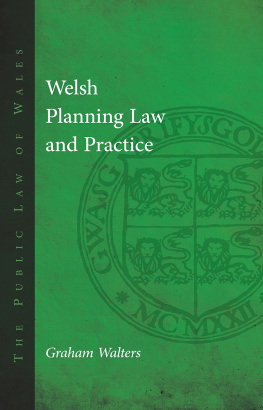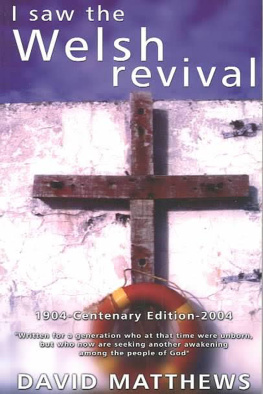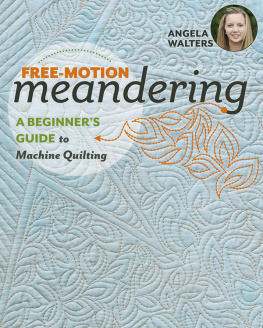T H E P U B L I C L A W OF WALES
Welsh Planning Law and Practice
T H E P U B L I C L A W O F W A L E S
Welsh Planning Law
and Practice
Graham Walters
UNIVERSITY OF WALES PRESS
2017

Graham Walters, 2017
All rights reserved. No part of this book may be reproduced in any material form (including photocopying or storing it in any medium by electronic means and whether or not transiently or incidentally to some other use of this publication) without the written permission of the copyright owner. Applications for the copyright owners written permission to reproduce any part of this publication should be addressed to the University of Wales Press, 10 Columbus Walk, Brigantine Place, Cardiff CF10 4UP.
The content of this publication does not constitute legal or other professional advice, and should not be relied upon as such. While every reasonable effort has been made to ensure that the content is accurate and up to date, any reliance on the content is solely at the users own risk.
www.uwp.co.uk
British Library CIP Data
A catalogue record for this book is available from the British Library.
ISBN 978-1-78683-155-2
eISBN 978-1-78683-157-6
The right of Graham Walters to be identified as author of this work has been asserted in accordance with sections 77 and 79 of the Copyright, Designs and Patents Act 1988.
The publisher has no responsibility for the persistence or accuracy of URLs for any external or third-party internet websites referred to in this book, and does not guarantee that any content on such websites is, or will remain, accurate or appropriate.
Series Preface
F or several centuries after the union of the two countries under the Tudors, the laws which applied in England and the laws which applied in Wales were almost exactly identical. Although administered differently in Wales by the courts of Great Session, the laws were not different. Only in the nineteenth century, barely half a century after the abolition of the Great Sessions in 1830, did laws begin to be made for Wales which did not apply in neighbouring England. The number of such laws however remained small when compared with those which were common to both countries. England and Wales was a single law district with a single law the law of England and Wales, which was in reality English law.
Devolution has changed that situation significantly. The creation of the National Assembly for Wales and its subsequent acquisition of primary law-making powers has meant that there is now a growing number of differences between the laws which apply in Wales and those which apply in England. Although in the majority of cases, the laws of the two countries remain the same, there is an increasing divergence in the rules relating to those matters which have been devolved. In truth, there are now three bodies of law in England and Wales: one which applies only in Wales; a second which applies only in England, and a third which applies in both countries. Whenever the National Assembly legislates for Wales or the United Kingdom Parliament legislates only for England, the divergence increases. As that divergence increases, so does the importance that lawyers, law students and the public should be able to inform themselves of what the law is in Wales. People need to know the laws which govern their lives from the perspective of the society in which they live. In both countries, lawyers need to know what the law is on either side of the border
The temptation has been to present the law which applies in Wales in terms of the law which applies in England, while merely noting the differences. As divergence increases, that approach becomes not merely unhelpful from a Welsh perspective, but unacceptable. The purpose of this series therefore is to present to the professions and to the public an account of the law as it applies in Wales in the areas where there is now divergence, and in so doing to both redress the deficit and provide the foundation for a legal literature to serve the distinct needs of Wales.
Thomas Glyn Watkin
Contents
Foreword
T he modern law relating to town and country planning in England and Wales has its roots in the Town and Country Planning Act 1947. This Act of the United Kingdom Parliament was one of a number of statutes passed in the years immediately after the cessation of war that was to have a profound influence over the lives of the citizens of the United Kingdom. By virtue of the 1947 Act owners of land were required to obtain permission from local planning authorities to develop their land except in very limited circumstances. Development of land encompassed two concepts: the making of a material change of use of the land in question or the carrying out of building and other defined operations on or over the land. An individuals right to use or build upon his land as he pleased was henceforth to be curtailed.
Decisions about whether or not planning permission for development was to be granted were entrusted in the first instance to local planning authorities. Invariably, these authorities were local councils or bodies which were given specific powers by the 1947 Act. This was an explicit recognition by Parliament that decisions about development of land, at least at first instance, were best made locally.
Against this background it is hardly surprising that as soon as law-making powers were devolved by the United Kingdom Parliament to law-making institutions in Northern Ireland, Scotland and Wales, the law relating to town and country planning was considered fit for consideration by those devolved institutions. The Government of Wales Act 1998 conferred express powers upon the National Assembly for Wales to legislate in respect of town and country planning.
That is not to say that the National Assembly thereby became the sole legislator in respect of town and country planning in Wales. The Town and Country Planning Act 1990, which was the governing statute for England and Wales at the time of the creation of the National Assembly, was not repealed in so far as it related to Wales. The result has been that those affected by or interested in the law relating to town and country planning have needed to look both to Acts of the United Kingdom Parliament and to the legislation of the National Assembly in order to ascertain the law as it is in force in Wales. Currently, the Town and Country Planning Act 1990 enacted by the United Kingdom Parliament stands side by side with the Planning (Wales) Act 2015 enacted by the National Assembly.
Those familiar with this area of the law will know that primary legislation is just the starting point in seeking a thorough understanding of the applicable law. In this field secondary legislation is detailed and complex, ministerial guidance is routinely issued to assist in the interpretation of the law or published planning policy and, of course, since 1947, there has been an ever-growing body of case law which has grappled with the plethora of disputes thrown up by this complex area of the law.
Thus, the time is ripe for a comprehensive analysis of the law of town and country planning as it relates to Wales. Graham Walters is extremely well placed to provide that analysis. Throughout his career as a barrister in Cardiff he has demonstrated a keen interest and genuine expertise in planning law. The reader of Welsh Planning Law and Practice will find invaluable guidance about the substantive law and procedure. Practitioners in the field will find that it fills a large void; those who are interested in the development of Welsh law will find a comprehensive account of a dynamic process.













